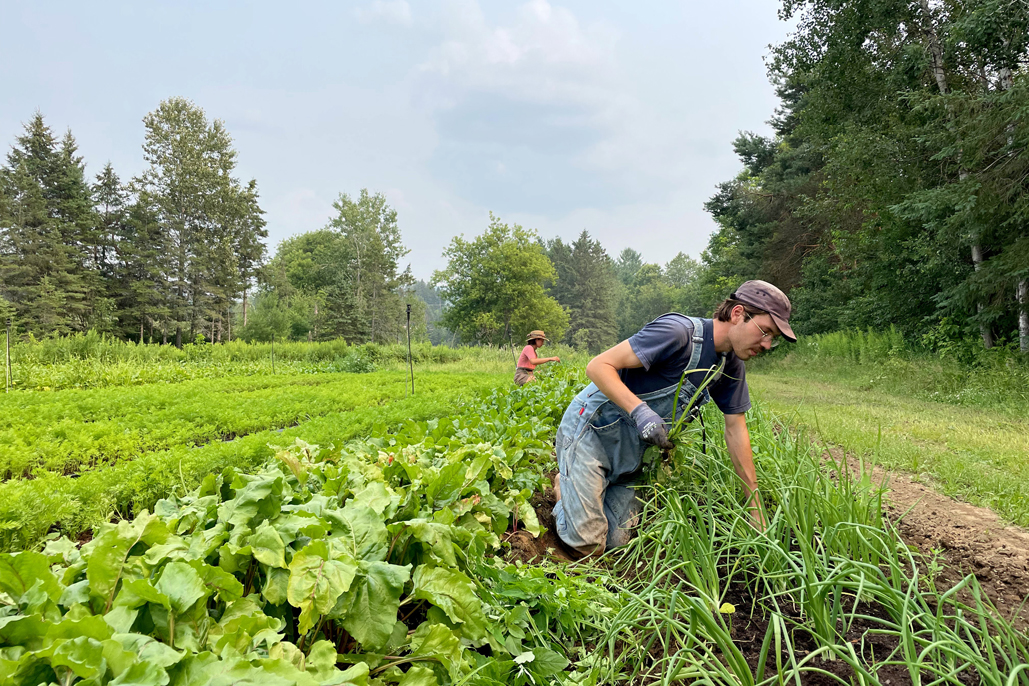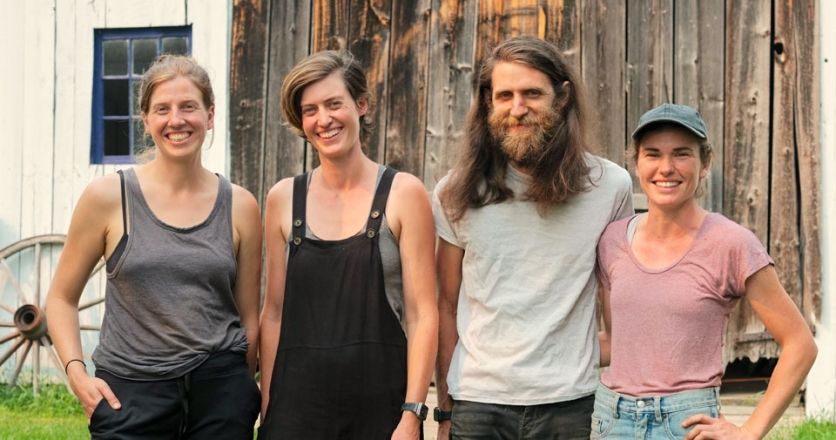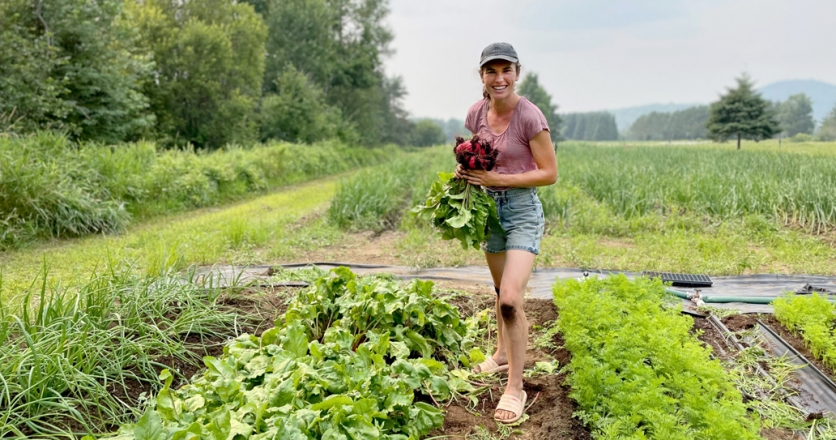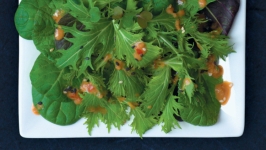Living and Farming Together
They’ve travelled many thousands of kilometres and worked the land all over this vast country, but in 2019 the four owners of Agricola Cooperative Farm planted roots in the rolling fields and forests north of Montebello, about an hour’s drive from Ottawa.
It’s been a journey of discovery for Heather Syposz, Caleb Langille, Hannah Hunter and Natalie Childs, from the moment they met during the renowned foundation year program at the University of King’s College in Halifax. And while the program has nothing to do with farming directly, it attracts the kind of students who have a broad interest in some of life’s larger questions. “Looking for meaning is part of that program,” explains Childs, “and it offers perspectives on different approaches to living.” The four, all now 33 years old, had a vision and a vague idea that they would like to live and farm together.
Since that time in Halifax however, life has taken them in entirely different directions. In 2012, Syposz and Hunter worked as apprentices on New Brunswick’s pioneering organic mixed vegetable farm, Whaelghinbran, near Sussex, while Langille and Childs headed to Klippers Organics in the Similkameen Valley in South Okanagan, B.C., to work on a mixed vegetable and fruit farm for a season. From there, they moved to Salt Spring Island for a winter season, to farm sit and learn about over-wintering vegetables and starting seedlings in greenhouses in the early spring.
Hunter then moved to Toronto, to Fresh City Farm in Downsview Park. “This is a two-acre urban farm that grows some of the vegetables for the grocery stores and delivery,” she explains. She managed the farm for five years. “It was a wonderful experience, it was very beneficial to have the opportunity to manage a farm, with all that entails, before starting my own business. I was also grateful to be working in such a lively community. The urban farm setting gave me the opportunity to be in an educational role and engage with the community, connecting urban eaters to agriculture and local food.”
Syposz and Childs eventually moved to Low, in the Outaouais region, where Child’s parents now live. They learned about organic flower-growing at Franktown House Flowers just outside Wakefield, then spent two seasons at Ferme Lève-tôt, a 12-acre organic farm that delivers CSA baskets to Ottawa and keeps a large stall at the Wakefield farmers’ market. Langille joined them during the summer breaks, fitting this around his job as a professor in the foundation year program at King’s College. He has subsequently worked at Alvéole, an urban beekeeping business in Montreal, tending to hives on buildings in the downtown core. “We're hoping to start our own hives next year,” he says.
After two seasons, Syposz moved to Ferme Tourne-sol co-operative on the West Island of Montreal. “It was very helpful to work at a co-operative prior to starting one, to see how they managed the division of labour and the structure of the farm up close,” she says. “The owners of Tourne-Sol are amazing employers and gave me lots of insight into the management of the farm.” She also, of course, garnered more experience growing vegetables and added cut flower production and bouquets to her list of skills.
Childs also moved east, to spend two years on La Ferme des Quatre Temps in Hemmingford, Que. Ferme Quatre Temps is a teaching farm that aims to show what the farm of the future might look like and is financially supported by André Desmarais of the Power Corporation of Canada fortune. “The focus was really on preparing us to start our own projects,” Childs explains. “That helped me set my ambitions high for our own farm and dream bigger than I had previously. We were each given a lot of responsibility; I learned first- hand how to produce a huge amount of vegetables on a small surface area. As greenhouse manager, I was also able to dive into the technical aspects of greenhouse production and season extension.” The experience also provided her with an invaluable network of other committed farmers, many of whom have now gone on to start their own farms.
For two years, Childs and Langille farmed two and a half acres of land near Buckingham, Que., until the fall of 2019, when the group of four joined forces once again to buy the 160-acre property where they now live with their Australian Cattle dog Hibou, near Papineauville, Que.
They decided to operate the farm as a co-operative where the four are owners and workers. “This setup has values baked into it,” Childs says, “and we’re aiming for the consensus model. We are looking out for the good of the business, but also to provide meaningful work for ourselves. We are doing it because we want to have jobs we love. And we’ve also built into it the idea of not burning ourselves out.” The owners now also have up to five employees during the growing season.
Agricola Cooperative Farm is well known in the region as an established asparagus farm, formerly known as Ferme La Macédoine, planted and maintained by artist, poet and farmer Guy-Louis Poncelet, who arrived from Belgium 40 years ago. The property boasts asparagus sculptures, a century-old barn and a lovely traditional farmhouse built in the 1920s, complete with storm windows from the Chateau Montebello, a few kilometres down the road. Poncelet has moved into the town of Saint-André-Avellin nearby and continues to mentor the four new owners while they get to know the asparagus business.
With an onsite asparagus stand in the spring and three acres turned over to the vegetable, Agricola Cooperative Farm already has a built- in clientele. However, the new owners have also launched ambitious plans to expand into early season greenhouse-grown vegetables such as tomatoes, cucumbers and greens as well as cut flowers, season- long CSA baskets grown on four acres and honey production, to say nothing of the asparagus festival they are planning for May. “We’ll be offering farm tours, a seedling sale, and, of course, plenty of asparagus,” says Childs, noting the farm’s relative proximity to Ottawa. It was important to the team to be close to a sizeable market. “This farm has to support four people,” Childs points out, “which is one of the reasons we are glad to be close to the city.”
They’ll also be selling their produce at the weekly Main Street Farmers’ Market, which launches May 14, at the on-farm kiosk, through the Aliments Farmhouse Food producers co-operative and CSA baskets.
Last year, the farmers launched a solidarity share program, to make local and organic vegetables more accessible across income brackets. Using a clever cost-share approach that is split three-ways between the solidarity share customer, community donations and the farm owners, they were able to offer multiple shares. Agricola Farm owners “requested donations from our CSA members as they were signing up, as well as other members of our community and we were blown away by the generosity of their support,” Childs says.
Through this method, Agricola Farm offered 15 solidarity shares. In 2022, the owners intend to significantly expand the program to as many as 50 shares. “If we are able to reach this goal, it will be in large part thanks to our community partners. We work with Somerset West Community Health Centre in Ottawa and the MRC Papineau and Alliance Alimentaire here in the Petite Nation to distribute the vegetable baskets and to help find interested participants,” Childs explains.
Agricola Cooperative Farm
502 Route 353, Papineauville, Que.
fermeagricola.com | @fermeagricola








